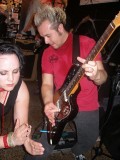Tuck

Joined: Sep 02, 2006
Posts: 3166
Denver, CO







|

Posted on Mar 26 2007 03:51 AM
Ernesto Lecuona (1895-1963). He was born in Havana - or actually in Guanabacoa, a suburb now absorbed by it. He died in Tampa. A pianist and a very productive composer. His work is sometimes stigmatized as "light," though not usually in front of armed Cubans. This is perhaps because he was very much involved in show business as a performer, a band-leader, and writer of musicals. He had no problems with marketing his stuff as pop. Very like the classical composers, I gather, but without the veil of historical distance to make it look all, well, classical.
Major surf compositions:
Malaguena - sixth movement of his Andalucia Suite
_Andaluza_ - second movement of his Andalucia Suite
_Siboney_
I don't know the exact date, but he was performing these in the 1920s.
Andaluza is better known as The Breeze and I, and, in fact, it appears that he recorded it under the title of La Brisa i Yo himself. Or maybe that refers to his briss.
Ciboney or Siboney is apparently the name of a relict Native American group in Cuba. Wikipedia says there are about 253 Ciboney families living in Florida these days.
Incidentally, Ernesto Lecuona's cousin Margarita Lecuona wrote Babalu, later famous as Desi Arnaz's theme song, and also pretty well known in surfing circles, not to mention in I Love Lucy circles.
Malaguena is pretty clearly intended to be either in the style of folk music from Malaga in Spain, or perhaps even specifically in the Flamenco palo called Malaguena or "Malagan." However, it appears that it may not be a wholesale drafting of an earlier model. The pieces are certainly familiar enough.
For a summary of the history of Malaguena see
-
Wikipedia on the song Malaguena
-
Wikipedia on the Malaguena(s) palo
It's not entirely clear how Malaguena got from Lecuona's version to the Surf version. Earliest by the Trashmen? I suspect the Bill Haley & the Comets version, or possibly the Connie Francis version. I haven't heard either one. I have heard the Bill Holman arrangement as performed by the Stan Kenton Orchestra, since that's on YouTube. That might be the genesis of the others. The only rock version I have heard is one by Buchanan which is close enough to Lecuona's piano version that I think Buchanan adapted it from that. It is definitely not the surf arrangement.
Just to be perfectly above board - the surf commentary in the first article above was from me, so don't put too much faith in it!
Last edited: Apr 16, 2007 17:27:49
|
Tuck

Joined: Sep 02, 2006
Posts: 3166
Denver, CO







|

Posted on Mar 26 2007 04:15 AM
Incidentally, I believe malaguena - it ought to be malagueña - is pronounced something like mah-lah-GAY-nyah, though most Americans say mal-uh-GWAYN-yuh or mal-uh-GWAYN-uh. It is the feminine form of the adjective "Malagan" refering to Malaga in Spain.
|
bigtikidude

Joined: Feb 27, 2006
Posts: 25580
Anaheim(So.Cal.)U.S.A.






|

Posted on Mar 26 2007 04:07 PM
I always thought it meant Old Lady???
Jeff(bigtikidude)
— Jeff(bigtikidude)
|
Tuck

Joined: Sep 02, 2006
Posts: 3166
Denver, CO







|

Posted on Mar 27 2007 01:01 PM
bigtikidude
I always thought it meant Old Lady???
Well, it is a feminine, so it can, and the lyrics Lecuona wrote refer to a mujer malagueña. So I suppose his version could be titled in English "the Lady from Málaga." But in general I think the reference is to música malagueña - music in the style of Málaga.
Actually, I´m not sure if the adjective malagueño is the proper form for a reference to someone from Malaga. This is as complicated in Spanish as it is in English. Just when you expect Indianan it turns out to be Hoosier. I´m guessing from those lyrics.
Last edited: Mar 27, 2007 17:10:45
|
90

Joined: May 16, 2006
Posts: 91
Florianopolis SC Brazil
|

Posted on Mar 27 2007 02:35 PM
Tuck
bigtikidude
I always thought it meant Old Lady???> Actually, I´m not sure if the adjective malagueño is the proper form for a reference to someone from Malaga. This is as complicated in Spanish as it is in English. Just when you expect Indianan it turns out to be Hoosier. I´m guessing from those lyrics.
I think it´s perfectly ok. One quick search on the oracle (google) shows that malagueño / malagueña is an adjective that can be used for either people or "things" from Malaga. 
A bit of trivia: chili peppers are known as "pimenta malagueta" (malaga peppers) in Brazil.
— http://www.myspace.com/cochabambas
http://gianninisupersonic.blogspot.com
|
spskins

Joined: Feb 27, 2006
Posts: 3780
tn







|

Posted on Mar 27 2007 04:52 PM
I've been to Malaga and its great for some fried baby octopus! It is also the birthplace of Pablo Picasso. Many Spaniards turn their noses up at it- it is primarily known as a seedy seaport full of prostitutes, sailors, fishermen, and low budget tourists who can't afford the nearby Costa Del Sol resorts. I loved it though (and no, not because of the prostitutes).
— http://www.satanspilgrims.com
http://www.facebook.com/pages/Satans-Pilgrims/8210228553
https://satanspilgrims.bandcamp.com/
http://www.surfyindustries.com
|
beatmantony

Joined: Apr 27, 2006
Posts: 178

|

Posted on Mar 27 2007 05:09 PM
Many Spaniards turn their noses up at it- it is primarily known as a seedy seaport full of prostitutes, sailors, fishermen, and low budget tourists who can't afford the nearby Costa Del Sol resorts. I loved it though (and no, not because of the prostitutes).
Been there, loved the place and the coast too. Drove up to Gibraltar and to the edge of Europe. As far as the prostitutes, they were there, that is why the Brits flock to the resorts. Anyway, that is news to me that Malaguena was written by a Cuban. Always thought that it was an old Flamenco standard. Great song.
|
Tuck

Joined: Sep 02, 2006
Posts: 3166
Denver, CO







|

Posted on Mar 27 2007 05:33 PM
beatmantony
Anyway, that is news to me that Malaguena was written by a Cuban. Always thought that it was an old Flamenco standard. Great song.
I was confused, too. I'm not sure I'm really straight on it yet. I think the association is because "Malagan" music is such a well known "style" within Flamenco, and because Lecuona deliberately aimed at adapting it in his song. But apparently experts argue about whether he was shooting for the Flamenco style per se or something more generic.
Wikipedia says this style was originally a fast song in 6/8 time, but modern versions were slower and now faster again and played in free time. The chord progression is more or less fixed:
The singing develops on a major mode (tonic, subdominant, dominant), resolving in the corresponding Phrygian mode of the same scale. The Frigian mode is used for the short interludes after of before verses. The usual progression is the typical of all fandangos:
-
First line of singing: G7, C Major
-
Second line: C Major, C7, F Major
-
Third line is just a repetition of the first
-
Fourth line: C Major, G7
-
Fifth line: G7, C Major
-
Sixth line: C Major, C7, F Major, G Major, F Major, E Major To this typical progression other transition chords can be added. For example, D7 is often used in the transition to G Major. A minor often appears in guitar interludes (or even during the singing, as in the case of the Malagueña del Mellizo). These chords can also be transported by using a capo on the guitar, maintaining the same chord positions.
To my ear Pepe Romero's version of Malagueña is in 3/4, so probably the remark about 6/8 above applies. The Lecuona piano version I have is sort of hard to count, but seems to be mostly 123 123, with emphasis on the 3. It's quite variable in tempo. It might be 6/8 or 12/8. Since the surf version is 4/4, there are some immediate and obvious differences. It's not entirely clear to me yet what the progression was from Lecuona's version to the one we know and love. There's a strong family resemblance, but it's almost like somebody heard the original and then reproduced it from memory, transmuting it in the process.
beatmantony
Great song.
That's for sure.
|
Tuck

Joined: Sep 02, 2006
Posts: 3166
Denver, CO







|

Posted on Apr 16 2007 03:29 AM
Tuck
It's not entirely clear how Malaguena got from Lecuona's version to the Surf version. Earliest by the Trashmen? I suspect the Bill Haley & the Comets version, or possibly the Connie Francis version. I haven't heard either one.
There's a fragment of the Bill Haley version on line - just the itnroduction, which sounds pretty standard, e.g., like the start of the Roy Buchanan version.
Unfortunately, it appears that the CD citted in the link above is no longer available.
|
Anonymous

Joined: Nov 10, 2000
Posts: -180
|

Posted on Apr 16 2007 04:54 PM
 malaga?? sounds like my kind of place!!!! malaga?? sounds like my kind of place!!!! 
|
Eric_attack

Joined: Apr 14, 2007
Posts: 20
Baton Rouge, LA
|

Posted on Apr 16 2007 06:17 PM
Tuck
To my ear Pepe Romero's version of Malagueña is in 3/4
If your refering to the version of Malanquena on his Guitar Solos album I believe it is in 3/4. Its his father, Celedonio Romero's, arrangement and I performed it with a group last year and as far as I remember it was in 3/4 not 6/8. Its just a difference of accents anyways so not a big change.
— <a>Spring Break Shark Attack!</a>
|
Tuck

Joined: Sep 02, 2006
Posts: 3166
Denver, CO







|

Posted on Apr 27 2007 11:52 PM
I've been meaning to point out that Brian said all this before, and much more concisely.
|
Tuck

Joined: Sep 02, 2006
Posts: 3166
Denver, CO







|

Posted on Apr 28 2007 12:16 AM
Ericattack_
If your refering to the version of Malanquena on his Guitar Solos album I believe it is in 3/4.
Thanks, Eric. That's exactly the version. I appreciate confirmation on this.
Its his father, Celedonio Romero's, arrangement ...
Yeah, and I notice it's dated 1917 (or something close), which puts it a bit before Lecuona (1920s). So maybe the similarities are just generic "malaguena mode" resemblances? Or maybe Lecuona is later in the chain?
I'm still trying to figure out if there's a leap between Lecuona and ??? the Trashmen, or if it's just the title and mode connecting things there, too. I've only heard the Boss Martian's (?) tribute version of the Trashmen's version, anyway.
I haven't really had a chance to get back to this, except to locate a few new versions of songs named Malaguena. I'm pretty sure that both the Richie Valens and Roy Buchanan recordings of the name are based on Lecuona's version. And both were in circulation too late to be relevant, I think. I've just heard a snatch of the Bill Haley & the Comets version, and it sounds more like Lecuona, too. However, it was just a few bars at the beginning.
... and I performed it with a group last year ...
Very cool! What kind of group? You mean as an acoustic piece or something else?
... and as far as I remember it was in 3/4 not 6/8. Its just a difference of accents anyways so not a big change.
I need all the help on time signatures that I can get. Starting with being reminded to notice them. I have started trying to do that and I've found some few oddities I hadn't noticed before.
I gather the difference between something like 3/4 and 6/8 is partly a matter of (a) tempo and (b) possibilities in placing accents (what you pointed out) than otherwise.
Anyway, I am definitely not in a position to identify the time signatures in Bulgarian dances. Maybe someday. For now just 4/4 vs. 3/4!
|

































